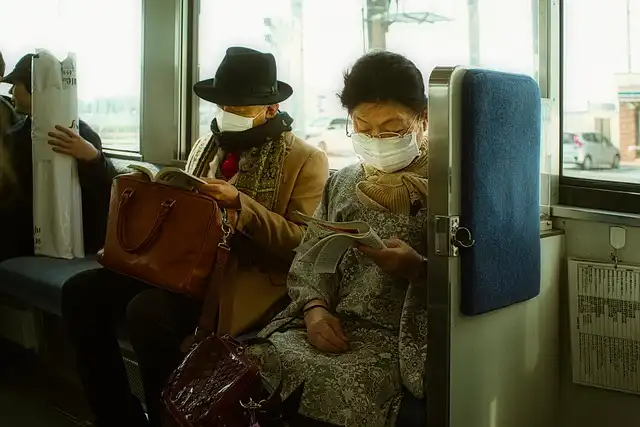Japan’s Shift to Regular COVID-19 Vaccination for Elderly
- Normal Liver Cells Found to Promote Cancer Metastasis to the Liver
- Nearly 80% Complete Remission: Breakthrough in ADC Anti-Tumor Treatment
- Vaccination Against Common Diseases May Prevent Dementia!
- New Alzheimer’s Disease (AD) Diagnosis and Staging Criteria
- Breakthrough in Alzheimer’s Disease: New Nasal Spray Halts Cognitive Decline by Targeting Toxic Protein
- Can the Tap Water at the Paris Olympics be Drunk Directly?
Japan’s Shift to Regular COVID-19 Vaccination for Elderly
- Should China be held legally responsible for the US’s $18 trillion COVID losses?
- CT Radiation Exposure Linked to Blood Cancer in Children and Adolescents
- FDA has mandated a top-level black box warning for all marketed CAR-T therapies
- Can people with high blood pressure eat peanuts?
- What is the difference between dopamine and dobutamine?
- How long can the patient live after heart stent surgery?
Japan’s Shift to Regular COVID-19 Vaccination for Elderly
The Japanese government’s Subcommittee on Vaccination and Vaccine Division of the Health Sciences Council convened on November 22, deciding that COVID-19 vaccine administration from the fiscal year 2024 onwards will be conducted periodically, primarily targeting the elderly.
This marks a new phase in vaccine strategies.
The administration of the COVID-19 vaccine began in February 2021 under the framework of “special temporary vaccinations.” These were administered when the Minister of Health, Labor, and Welfare deemed it urgently necessary for the prevention of widespread infection, with the government covering all associated costs. Initially, vaccination was recommended for the entire population, with a voluntary obligation for individuals to get vaccinated. Given the infectiousness and severity of the initial strain of the novel coronavirus, it was crucial to protect not only individuals but the entire society through vaccination.

Since the commencement of vaccination, over 70% of the Japanese population received their first dose (up to the second dose) by the autumn of 2021. Subsequent additional vaccinations were carried out under special temporary measures. To enhance immunity and prevent infection and severe cases of COVID-19, regular booster shots became necessary.
As a result, by the beginning of 2022, although infections continued to occur, the cases of severe illness decreased. This was attributed not only to the effectiveness of vaccines but also to the Omicron variant, which emerged globally at the end of 2021 and exhibited a lower tendency to cause severe illness. Additionally, the use of multiple antiviral drugs contributed to suppressing severe cases.
Considering these circumstances, by November 2023, there was no longer a need to treat COVID-19 as a target disease under special temporary vaccination measures. Consequently, it was decided to categorize it as a Class B regular vaccination from the next fiscal year.
Transition to Protecting Individuals:
Regular vaccinations consist of Class A primarily targeting children and Class B targeting the elderly, including vaccines for influenza and pneumonia. Since older individuals are at risk of severe complications from such infections, municipalities subsidize vaccination to prevent these complications. Given the risk of severe illness in older adults with COVID-19, it was included in Class B for regular vaccinations. While the previous COVID-19 vaccination focused on “protecting society and individuals,” the shift is now towards “protecting individuals prone to severe complications.”
It’s essential to note that individuals other than the elderly are not excluded from receiving vaccinations. Similar to the influenza vaccine, those who wish to receive the COVID-19 vaccine can do so as an optional paid vaccination. Currently managed by the government, the COVID-19 vaccine is expected to be available for commercial purchase from the next fiscal year. Medical institutions will purchase and administer the vaccine to individuals opting for regular or optional vaccination.
Focus on Vaccines with Minimal Side Effects:
mRNA vaccines played a significant role in controlling the spread of the novel coronavirus, earning Dr. Katalin Karikó and others from the University of Pennsylvania the Nobel Prize in Physiology or Medicine in 2023. However, mRNA vaccines often lead to local reactions at the injection site, swelling, pain, as well as systemic reactions like fever and fatigue at a relatively high rate.
In Japan, the majority of individuals vaccinated so far have received mRNA vaccines, and there is a perception that COVID-19 vaccines, in general, tend to cause local and systemic reactions. Nevertheless, Japan has also used recombinant protein vaccines, which have been reported to have fewer systemic reactions such as fever and fatigue by a research team from the Ministry of Health, Labor, and Welfare (source: Link).
While mRNA vaccines were initially hailed as saviors during the early stages of the pandemic, with the current stabilization of the situation, it is necessary to consider the use of vaccines with fewer side effects, such as recombinant protein vaccines. In Japan, there are manufacturers applying for approval for their domestically developed recombinant protein vaccines, and others developing inactivated vaccines similar to those used for influenza. Especially with the potential introduction of paid vaccinations in the future, it is expected that more people will opt for vaccines with fewer side effects.
As the COVID-19 vaccine strategy in Japan enters a new phase, it is not only the legal aspects but also the types of vaccines that need consideration.
Japan’s Shift to Regular COVID-19 Vaccination for Elderly
references:https://news.yahoo.co.jp/articles/b17af97724fe18d1b18ade65c3675b2b7526f9f9?page=1
(source:internet, reference only)
Disclaimer of medicaltrend.org
Important Note: The information provided is for informational purposes only and should not be considered as medical advice.



